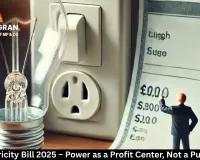India's Cough Syrup Crisis 2025: A Wake-Up Call for Pharmaceutical Reforms
Digital Desk

In October 2025, India's pharmaceutical sector, often hailed as the "pharmacy of the world," faces its gravest credibility crisis yet due to contaminated cough syrups causing child deaths nationwide. The scandal, involving toxic diethylene glycol (DEG) in products like Sresan Pharmaceuticals' Coldrif syrup, has claimed at least 24 young lives, exposing deep-rooted flaws in manufacturing and regulation.
The crisis traces back to cost-cutting practices where DEG, a cheap industrial solvent, replaces safer ingredients like glycerine. In May 2025, a Coldrif batch tested at 48.6% DEG—far exceeding safe limits—led to acute kidney failures in children like 3-year-old Mayank Suryavanshi. This isn't isolated; similar contaminations linked to over 140 deaths abroad in prior years prompted WHO alerts, damaging India's $50 billion industry reputation.
The government's response has been firm but belated. In 2023, mandates required upgrades to WHO good manufacturing practices (GMP) by December 2024 for small firms. Despite industry pleas for extensions citing bankruptcy risks, authorities refused in October 2025, revoking Sresan's license, arresting its founder, and launching recalls. Random sampling and door-to-door campaigns are underway, with new rules demanding pre-sale DEG testing for oral liquids.
Yet, in my view, this reactive approach highlights systemic failures. Why apply stringent export testing but lax domestic standards? Selective enforcement erodes public trust, especially when small enterprises, comprising most of India's 10,000 factories, struggle with upgrade costs. Families' grief—parents lamenting "simple medicine" turning lethal—demands accountability beyond arrests.
The impacts are profound: economic fallout from potential shutdowns could cause drug shortages and job losses, while public health suffers. Mental anguish for survivors and families compounds the tragedy. As "pharmacy of the world," India risks boycotts if reforms lag.
Opinion-wise, the Modi administration must prioritize prevention over punishment. Investing in affordable tech for small firms, stringent supply chain audits, and independent oversight could avert future disasters. Empowering the Central Drugs Standard Control Organisation with more resources is crucial.
Ultimately, this crisis underscores greed's human cost in healthcare. By enforcing GMP universally and fostering ethical practices, India can reclaim its global standing. In October 2025, with investigations ongoing, it's time for transformative change to protect the vulnerable.


.jpg)








